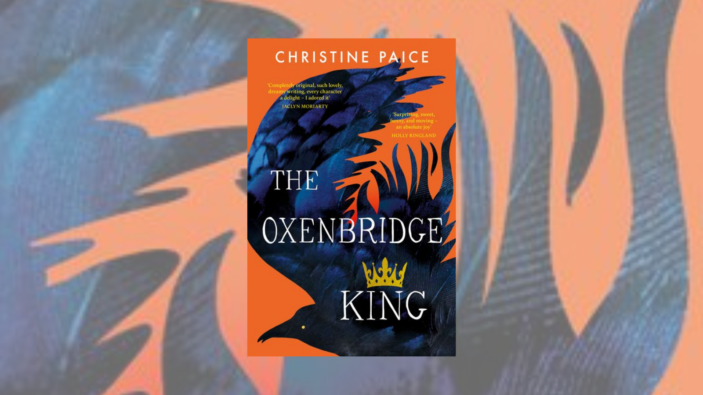
King Richard the Third is dead, but his soul is not at peace. Guided by a quixotic raven, he makes his way through the space in between life and dead, searching for the angel who will lead him to what is next, whatever that may be. Meanwhile, at an Abbey in Oxenbridge, a monk named Dedalus, who once met this infamous King, cannot quite believe that the monarch is dead and yet a piece of his skull has been brought back as a relic. Dedalus, at odds with another member of his household, finds himself locked in a cellar below the church, doomed to wander around below ground for centuries.
Thus begins The Oxenbridge King, a poetic and philosophical little morsel of a novel about life, death, redemption, magic and love. Its author, Christine Paice, is also a poet, and it shows in the language that flows through the absurdities of the novel’s plot, skating by as if it were nothing for a talking Raven to call a former king ‘Ricardo’, or for a monk to live for hundreds of years underground, only to emerge centuries later as a kind of raving angel. On paper, this book should not work. To explain it chronologically to another person, it sounds too bizarre to work. And yet, the polished and highly original way with words that has been applied to this novel make it sing.
Inspired by the discovery of the remains of Richard the Third beneath a carpark, the story also contains a more modern, linear storyline in which a young woman named Molly Stern finds her life intersecting with those of the other, less mortal characters.
Molly’s world of 2013 is one in which the London Olympics have just taken place, and cyclist Bradley Wiggins warrants a mention or two, having recently won both a gold medal and the Tour de France in the previous year. Molly’s life, unlike Bradley Wiggins’ has had decidedly less luck of late, as a serious relationship has just ended and Molly has retreated to Oxenbridge and the comfort of her Uncle and Aunt.
Her Uncle is keenly following the story of Richard III’s reinterment, while her Aunt seems keen that Molly should better get to know a young man who works in her shop. Both Molly’s Uncle, and the young man (Edward), are unbeknown to each other, exploring a network of strange tunnels.
Those who have seen The Lost King starring Sally Hawkins may find that the novel chimes well with that concept, as both blur the lines between history and the fantastical, and neither seeks to pass any final judgement on whether the king was as evil as Shakespeare’s depiction of him may have us believe.
Perhaps frustratingly, though ‘Ricardo’ (as he comes to be known) is frequently asked to repent of his sins and confess as to whether or not he was responsible for the deaths of the Princes in the tower, the author takes a more nuanced approach to the ideas of guilt and responsibility, offering no definite opinions on the matter.
Whether or not the ghosts and angels in this novel are supposed to be real or metaphorical, the novel is still a surprising delight, and prickly Molly is a refreshing heroine. Paice’s work has been compared to that of Sarah Winman and to the late, great Hilary Mantel. But, those going into this novel expecting a historical epic may find themselves disappointed, as the novel aligns itself more with cosy, urban fantasy and literary fiction. There are echoes of Neil Gaiman’s Neverwhere and even Alice in Wonderland too. Though I suspect that with writing this multi-faceted, each reader will find themselves reminded of something different.
![]()
![]()
![]()
![]()
![]()
FOUR AND A HALF STARS (OUT OF FIVE)
The Oxenbridge King by Christine Paice is out now from HarperCollins Australia. Get yourself a copy from your local bookstore HERE.
